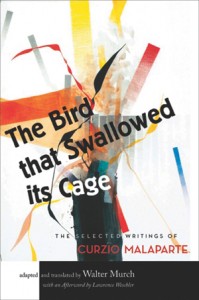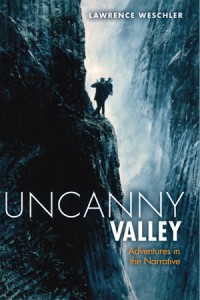Lawrence Weschler
Lawrence Weschler is regarded as one of the leading practitioners of literary nonfiction. His essays have appeared in The New Yorker for over twenty years, and his series of "Convergences" is a regular feature in McSweeney's Quarterly. The recipient of a Lannan Literary Award and the National Book Critics Circle Award for Criticism, he currently teaches at New York University.
Subscribe to our newsletter for news & events from Counterpoint Press.
Books
The Bird that Swallowed Its Cage
The Selected Writings of Curzio Malaparte
Walter Murch first came across Curzio Malaparte's writings in a chance encounter in a French book about cosmology, where one of Malaparte's stories was retold to illustrate a point about conditions shortly after the creation of the universe. Murch was so taken by the strange, utterly captivating imagery he went to find the book from which the story was taken. The book was Kaputt, Malaparte's autobiographical novel about the frontlines of World War II.Curzio Malaparte, an Italian born with a German heritage, was a journalist, dramatic, novelist and diplomat. When he wrote a book attacking totalitarianism and Hitler's reign, Mussolini, in no position to support such a body of work, stripped him of his National Fascist Party membership and sent him to internal exile on the island of Lipari. In 1941, he was sent to cover the Eastern Front as a correspondent for Corriere della Sera, the Milano daily newspaper. His dispatches from the next three years would be largely suppressed by the Italian government, but reverberated among readers as painfully real depictions of a landscape at war.
The film editor, fluent in translating the written word over to the languages of sight and sound, began slowly translating Malaparte's writings from World War II. The density and intricacy of his stories compelled Murch to adapt many of them into prose or blank verse poems. The result is a book of surprising insight and strange beauty.
Uncanny Valley
Adventures in the Narrative
Shuttling between cultural comedies and political tragedies, Lawrence Weschler's articles have throughout his long career intrigued readers with his unique insight into everything he examines, from the ordinary to the extraordinary.Uncanny Valley continues the page–turning conversation as Weschler collects the best of his narrative nonfiction from the past fifteen years. The title piece surveys the hapless efforts of digital animators to fashion a credible human face, the endlessly elusive gold standard of the profession. Other highlights include profiles of novelist Mark Salzman, as he wrestles with a hilariously harrowing bout of writer's block; the legendary film and sound editor Walter Murch, as he is forced to revisit his work on Apocalypse Now in the context of the more recent Iraqi war film Jarhead; and the artist Vincent Desiderio, as he labors over an epic canvas portraying no less than a dozen sleeping figures.
With his signature style and endless ability to wonder, Weschler proves yet again that the "world is strange, beautiful, and connected" (The Globe and Mail). Uncanny Valley demonstrates his matchless ability to analyze the marvels he finds in places and people and offers us a new, sublime way of seeing the world.

Catapult | Counterpoint | Soft Skull
20 Jay Street #704
Brooklyn, NY 11201
646.926.0805 | contact@catapult.co






